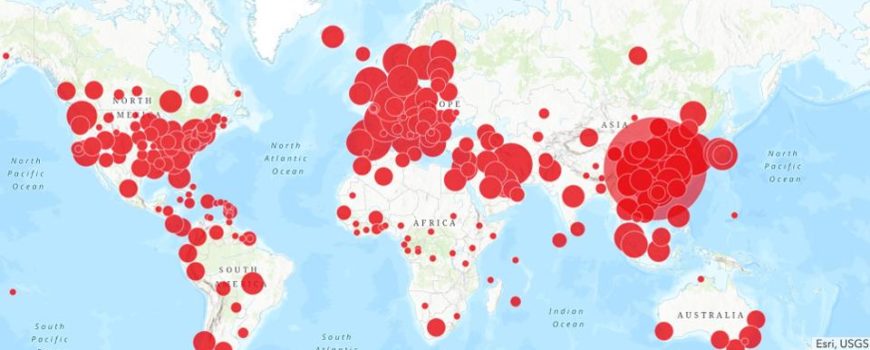Above image: countries with confirmed COVID-19 cases as of March 10th. Credit: CDC.gov
Below image: workers disinfecting streets in Xiaogon city, China. Credit: AFP via Getty Images.

It often takes adversity to spur creativity and innovation. Events that threaten our safety or shake our confidence alarm us, and often compel us to think and act with increased speed and focus.
But when an industry leader, such as Biogen, instructs all employees in Massachusetts, Research Triangle Park in North Carolina, and Baar, Switzerland to work from home following news that 15 employees who attended a management meeting in Boston have now tested positive for COVID-19, it raises the stakes for all of us.
Biogen is not alone. In a company email last Sunday, Eli Lilly asked its employees to work from home and restricted domestic travel. A growing list of major medical conferences have now been canceled and IQVIA’s CEO said in mid-February, that in some parts of China, test subjects were already missing visits.
Even more striking, Italy locked down the entire country yesterday. And today New York’s Governor announced a Coronavirus containment zone in New Rochelle. We can try to ignore the signals, but the warning lights are flashing red and no one can predict what tomorrow will bring.
In today’s interconnected world, travel restrictions and supply chain disruptions in one region can quickly reverberate across the globe. The question we have before us is how we will respond. Will these events drive us to implement a far more efficient operating model, or will we hope to ride out the storm and continue to drag our heels. In the past, we have told ourselves we don’t have the time, or the money, or that change is simply too difficult, or that the status quo is good enough.
We no longer have the luxury of slow rolling change and running away from innovation. When a pandemic restricts travel to sites, forces employees to work from home, and severely limits access to patients, we will feel the pain of our failure to evolve and to embrace the efficiencies a digital based model can provide. But when we are inefficient day in and day out, when we spend time and money we don’t need to spend, the delivery of new medicines and therapies is delayed and the costs to patients increase. Patients around the world suffer every day as a result.
The current global health scare represented by COVID-19 (and resulting economic and financial market turmoil) could prove to be the shockwave that finally pushes the clinical research industry to change, and that would be a welcome silver lining to this crisis.
Let’s Resist the Appeal of Half Measures.
All to often we take a piecemeal approach and launch trials with limited technology adoption, a half-step in the direction of modernization. Often new applications and digital tools are perceived as an added cost rather than a cost savings because we don’t adopt them in combination with the process changes and shift in resource utilization that they are meant to provide. Instead, the new technology is typically bolted onto the old, inefficient processes, making the monolith even bigger, slower, and more expensive.
Let’s not back existing processes and resourcing models into new technologies, especially given current events. Instead, let’s take fast, decisive action and embrace fresh thinking and all its potential. To steal an analogy from Henry Ford, let’s not attempt to strap an engine to a horse.
4 Pillars for Confronting the Pandemic and Accelerating Clinical Research
1. Embrace technology to drive efficiency.
Let’s take just one example to start, such as Investigator Meetings (IM), where technology can dramatically change how we operate.
At times when there isn’t a pandemic at hand, most teams don’t mind traveling to Monaco, Sao Paulo, or Berlin for the regional IM. However, when Italy is locked down and regional travel is severely restricted, those days may be long gone…at least in the short term.
Longer term, such meetings still cost millions of dollars, demonstrate limited ability to effectively prepare sites, and can actually slow down the startup process. Let’s imagine a new model that starts by replacing or reducing the number of IMs conducted in person around the world. Instead let’s focus on delivering more personalized, online experiences that enable all parties to cut travel, save time, reduce health risks, enjoy more effective learning experiences, and generate valuable data that informs clinical operations.
2. Use data. Streamline decision making.
As AI models continue to evolve, let’s think more practically how we can use data to inform clinical operations to make faster, better decisions that can dramatically improve protocol feasibility, take the guessing out of site selection, and accelerate site initiation and the first patient enrolled.
At a time when sites may limit or fully restrict non-essential personnel, let’s finally implement risk based monitoring and embrace novel forms of data that can help us to manage sites remotely and identify and mitigate risks sooner.
Taking this step today could enable study teams to tailor SIVs to limit travel and address site specific issues. It could enable risk-based models that result in smarter CRA assignments, limit IMV frequency and duration, and encourage more centralized monitoring that enables sponsors and CROs to retrain and redeploy critical resources in a challenging time. (Remember: Data can transcend a pandemic. Data doesn’t need a plane, train, automobile or entry visa.)
3. Empower patients. Employ hybrid virtual trials
Most of all, a trial cannot run without patients. If travel is restricted, or schools are closed and parents must stay home, or study sites are forced to cancel visits, then we must be prepared to deliver investigational product, collect data, and successfully conduct the study wherever the patient resides.
Over the past few years, we have heard the increasing call to embrace patient centricity echo across the industry, but now is the time to work through the logistical challenges and actually empower patients. To do so, clinical operations must adapt and ensure that our teams and patients are prepared to participate whether it is a siteless, virtual, hybrid or decentralized trial.
4. Work smarter whenever and wherever possible.
Let’s reward innovators. If they work themselves out of positions, let’s assign them to new challenges and reduce the fear that technology, process improvement, and efficiency mean smaller budgets and fewer people. Let’s focus on the fact that technology can deliver more available bandwidth and the opportunity to take on new work and expand. It can mean new skills and differentiated offerings, all leading to better opportunities for both patients and professionals.
Let’s Demand More from Ourselves.
We have a great history of rising to challenges. We have facilitated breakthroughs that have saved millions of lives and alleviated boundless suffering. We provide hope in situations where there has never been any. We do important work every day.
Let’s work smarter. Let’s be braver. Let’s not drag our heels, now or ever.










 ArcheMedX
ArcheMedX




